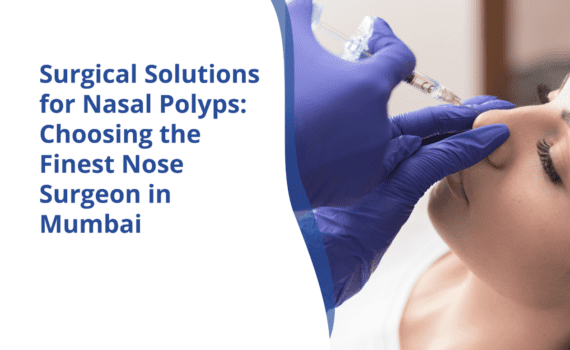
Surgical Solutions for Nasal Polyps: Choosing the Finest Nose Surgeon in Mumbai
At some point in our lives, we all experience the misery of a stuffy, runny nose and even pesky sinuses. It interferes with regular daily routine, makes it difficult to breathe and smell, and makes the head feel like a heavy weight is on it. This gets worse during the cold and allergy seasons. Now imagine people suffering from inflamed nasal polyps and chronic rhinosinusitis; this is their life.
What Are Nasal Polyps or Nasal Polyposis?
They are small, soft, painless, non-cancerous growths in the nose. They are yellow-brown in color and teardrop-shaped and grow at the lining of the nose or sinuses. They usually appear on both sides of the nose, making breathing difficult when irritated. Polyps are formed in groups. When they grow larger, they are either pink, yellow, or grey and colorize like a peeled grape. Inflammation of the nasal polyps is joint in people with asthma and allergies or those who get repeat nasal infections or rashes.
Polyps are common (affecting about 40% of people), and about 25-30% of sinus patients develop nasal polyps. The risk of getting polyps increases with age, and many people get them in their 30s and 40s. They do not have to always originate in the nose; they can grow anywhere on the mucosa of the sinus. The typical locations of polyps are the base of the brain, cheekbones, and the junction where the sinus drains into the nose near the eyes.
Symptoms of Nasal Polyps
Nasal polyps can happen to anyone. Small-sized polyps are not an issue, but when they are inflamed or grow larger, they can lead to many issues, such as congestion in the nose, breathing problems, loss of smell, and infections. Symptoms of polyps are
- Stuffy nose or nasal congestion
- Difficulty in breathing through the nose
- Rhinorrhoea (runny nose)
- Reduced sense of smell and taste
- Mucus running down the throat, i.e., the Postnasal drip
- Headaches
- Sinus pressure
- Cough
- Facial pain or pain in the upper teeth
- Itching around the eyes
- Snoring
- Nose bleeds
- Pressure around the sinuses
When left untreated, the nasal polyps can cause severe blockages in the nasal passage and sinuses and also cause
- Recurrent asthma attacks in asthmatic people
- Frequent and repeated sinus infections
- Sleep disorders such as sleep apnoea
- Difficulty in breathing, even in people who are not asthmatic
What Causes Nasal Polyps?
Nasal polyps’ causes are not fully known yet. Their development is linked with chronic rhinosinusitis, where nasal passage and sinus inflammation last about 12 weeks or more. Nobody knows the cause of polyps or why it affects some people but not others.
Joint research indicates that nasal polyps are caused by abnormalities in the immune system response and chemical markers in the lining of the nose and sinuses. The chemical markers are the signs that tell your body how to react to stimuli.
Nasal polyps are more likely to affect men than women. Children younger than ten rarely get nasal polyps. They are linked to many conditions such as asthma, sinus infections, allergy to aspirin, chronic and severe infections, something stuck in the nose, cystic fibrosis, etc., but the real cause is still unknown.
It is also believed that genetics also impacts the role of nasal polyps development.
Risk factors
There are some risk factors or conditions that can increase the risk of nasal polyps, including
- Asthma
- Hay fever
- Sinus infections
- Cystic fibrosis
- Hypersensitivity to certain drugs
If not treated correctly and in time by a good nose specialist doctor in Mumbai, nasal polyps can lead to severe complications, such as bone infections, bone loss, abscesses that can spread to the brain and eye sockets, and even meningitis.
If symptoms last more than ten days, then it is time to contact the best nose specialist doctor in Mumbai. You should also see the nose surgeon if
- The symptoms are getting worse.
- You notice vision changes or are seeing double.
- There is swelling in the forehead or around the eyes.
- You have a terrible headache that keeps getting worse.
- You have a stiff neck for no reason.
Diagnosis Of Nasal Polyps
A nose specialist should diagnose nasal polyps. The first step in making the correct diagnosis is a physical examination, for which the doctor will use a nasal endoscope. The surgeon will also ask about your medical history, e.g., if you have any sinus infections, are asthmatic, or have allergies.
If more investigation is needed, the doctor might request a CT scan, MRI, or a biopsy of the growth to confirm the size and location of the polyps. The nose specialist in Mumbai will also recommend allergy testing to identify the allergens that might be causing nasal polyps and inflammation.
Treatment for Nasal Polyps
Once the surgeon has confirmed the presence of nasal polyps, they will start with the treatment to help relieve congestion and pain discomfort. The standard treatment options for nasal polyps include:
- Medications: This is the first line of treatment for polyps used by nose specialists in Mumbai. Medications do not eliminate polyps, but they can minimize the symptoms. The common medications include:
- Corticosteroid nasal sprays that shrink the polyps.
- Oral steroids
- Antihistamines and decongestants to reduce the allergy symptoms
- Biologic medications that stimulate the immune system to shrink the nasal polyps.
- Antibiotics to reduce infections
- Surgery: When the medications do not give the necessary results, the nose specialist in Mumbai will recommend surgery to remove the polyps. Nasal polyp surgery is an outpatient procedure. The surgical method used is the nasal endoscopy for any of the following minimally invasive procedures:
- Polypectomy, in which the surgeon removes the polyps inside the nose using surgical instruments.
- Balloon sinuplasty is the procedure in which a small balloon is threaded through the nostril to the sinus cavity. The balloon is inflated to unblock the nasal passages. Nasal polyps can also be removed at the same time.
- FESS, which stands for functional endoscopic sinus surgery, is another surgical procedure that removes polyps, diseased tissues, damaged bones, and other obstructions to the nasal passages.
The surgery for nasal polyps is done through the nostrils, with no incisions or sutures visible on the outside.
Recovery and prevention of nasal polyps
Like any other nose surgery, the recovery period post nasal polyps treatment is critical. If nasal polyps are not treated correctly or post-surgical care is not followed well, the polyps are likely to return. Here are some tips to prevent such occurrences:
- Continue using the corticosteroid sprays to reduce the inflammation after the surgery.
- Adopt a humidifier, especially during winter and dry weather. A humidifier keeps the nasal passages moist, which helps with smooth mucus flow and reduces blockage and swelling in nasal polyps.
- Use a nasal spray or rinse to moisten the nasal passages for proper healing.
- Avoid irritating the nasal passages with passages with dust, smoke, dirt, and pollutants that can inflame them them.
- Keep allergies and asthma under check to keep the nasal passages clean and reduce swelling and tenderness.
- Practice good nasal hygiene.
- Wash your hands often, and do not touch your nose with dirty hands.
Nose Surgery Price in India
The cost of nose surgery for nasal polyps in India can vary depending on several factors, such as the location of the clinic or hospital, the surgeon’s experience and expertise, the complexity of the procedure, and the specific facilities provided. It is essential to consider additional costs such as pre-operative consultations, diagnostic tests, medications, post-operative care, and any potential complications that may require further treatment for nose surgery in India. The cost of nasal polyp surgery may vary depending on the location within India. Nasal polyps surgery performed in major cities or urban areas in India tends to be more expensive than in smaller towns or rural areas.
For More Details Contact Us Now!


